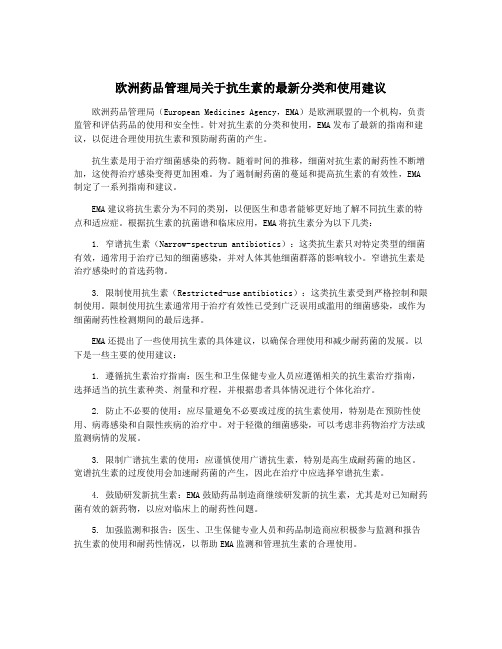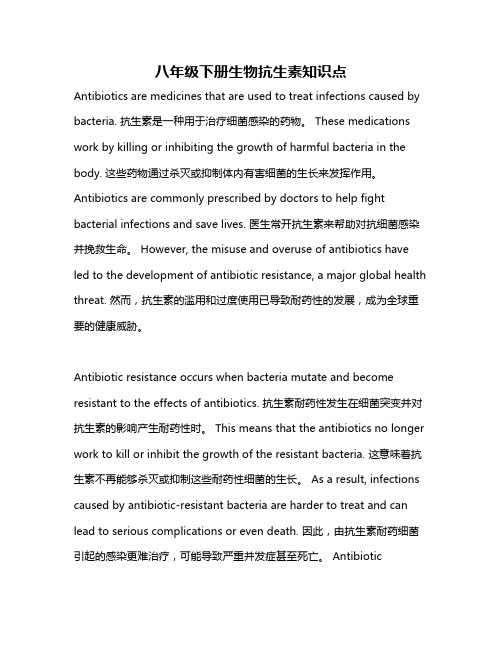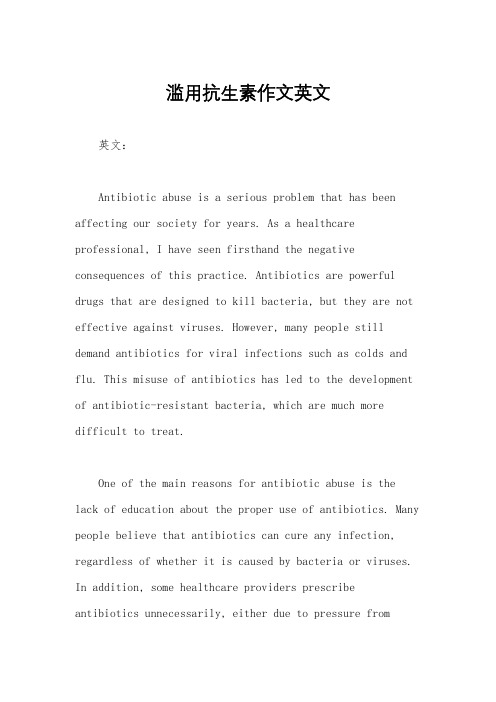抗生素的安全使用(英文)ProperUseofAntibiotics
抗生素滥用英文作文

抗生素滥用英文作文英文回答:Antibiotic misuse is the incorrect or excessive use of antibiotics. This can include taking antibiotics when they are not necessary, taking them incorrectly, or taking them for too long. Antibiotics are powerful drugs that can kill or stop the growth of bacteria. However, they are only effective against bacterial infections, and they are not effective against viral infections.Antibiotic misuse can have serious consequences. It can lead to antibiotic resistance, which is when bacteria become resistant to the effects of antibiotics. This can make it difficult or impossible to treat bacterial infections in the future. Antibiotic misuse can also cause side effects, such as diarrhea, nausea, vomiting, and allergic reactions. In some cases, antibiotic misuse can even be fatal.There are a number of things that can be done to reduce antibiotic misuse. These include:Only taking antibiotics when they are prescribed by a doctor.Taking antibiotics exactly as directed by your doctor.Not taking antibiotics for viral infections.Not sharing antibiotics with others.Finishing the entire course of antibiotics, even if you start to feel better.Talking to your doctor about any concerns you have about antibiotic use.By following these steps, you can help to reduce antibiotic misuse and protect your health.中文回答:抗生素滥用是指不正确或过度使用抗生素。
抗生素滥用英文作文

抗生素滥用英文作文English:The misuse or overuse of antibiotics has become a significant global health concern. This issue arises when antibiotics are prescribed unnecessarily, taken incorrectly, or used in agriculture and livestock. The misuse of antibiotics can lead to the development of antibiotic-resistant bacteria, making infections harder to treat and increasing the risk of spreading resistant bacteria to others. In addition, when antibiotics kill off the good bacteria in our bodies, it can disrupt the balance of our microbiome and lead to various health problems, such as digestive issues and weakened immune system. Furthermore, the overuse of antibiotics in agriculture can result in antibiotic residues in food products, which can have negative impacts on human health. It is crucial for healthcare providers, policymakers, and the general public to work together to educate themselves about the appropriate use of antibiotics and to implement strategies to combat antibiotic misuse.中文翻译:抗生素的滥用或过度使用已成为一个全球性重要的健康问题。
欧洲药品管理局关于抗生素的最新分类和使用建议

欧洲药品管理局关于抗生素的最新分类和使用建议欧洲药品管理局(European Medicines Agency,EMA)是欧洲联盟的一个机构,负责监管和评估药品的使用和安全性。
针对抗生素的分类和使用,EMA发布了最新的指南和建议,以促进合理使用抗生素和预防耐药菌的产生。
抗生素是用于治疗细菌感染的药物。
随着时间的推移,细菌对抗生素的耐药性不断增加,这使得治疗感染变得更加困难。
为了遏制耐药菌的蔓延和提高抗生素的有效性,EMA 制定了一系列指南和建议。
EMA建议将抗生素分为不同的类别,以便医生和患者能够更好地了解不同抗生素的特点和适应症。
根据抗生素的抗菌谱和临床应用,EMA将抗生素分为以下几类:1. 窄谱抗生素(Narrow-spectrum antibiotics):这类抗生素只对特定类型的细菌有效,通常用于治疗已知的细菌感染,并对人体其他细菌群落的影响较小。
窄谱抗生素是治疗感染时的首选药物。
3. 限制使用抗生素(Restricted-use antibiotics):这类抗生素受到严格控制和限制使用。
限制使用抗生素通常用于治疗有效性已受到广泛误用或滥用的细菌感染,或作为细菌耐药性检测期间的最后选择。
EMA还提出了一些使用抗生素的具体建议,以确保合理使用和减少耐药菌的发展。
以下是一些主要的使用建议:1. 遵循抗生素治疗指南:医生和卫生保健专业人员应遵循相关的抗生素治疗指南,选择适当的抗生素种类、剂量和疗程,并根据患者具体情况进行个体化治疗。
2. 防止不必要的使用:应尽量避免不必要或过度的抗生素使用,特别是在预防性使用、病毒感染和自限性疾病的治疗中。
对于轻微的细菌感染,可以考虑非药物治疗方法或监测病情的发展。
3. 限制广谱抗生素的使用:应谨慎使用广谱抗生素,特别是高生成耐药菌的地区。
宽谱抗生素的过度使用会加速耐药菌的产生,因此在治疗中应选择窄谱抗生素。
4. 鼓励研发新抗生素:EMA鼓励药品制造商继续研发新的抗生素,尤其是对已知耐药菌有效的新药物,以应对临床上的耐药性问题。
抗生素的优点和缺点英文作文

抗生素的优点和缺点英文作文Advantages and Disadvantages of AntibioticsAntibiotics are powerful medications that are used to treat infections caused by bacteria. They have saved countless lives and revolutionized modern medicine. However, like all medications, antibiotics have both advantages and disadvantages.Advantages:1. Effective at treating bacterial infections: Antibiotics are very effective at killing bacteria and stopping their growth. They can quickly alleviate symptoms and help the body to recover from infections.2. Life-saving: Antibiotics have saved countless lives by treating serious bacterial infections that would be fatal without treatment. They have played a crucial role in reducing mortality rates from infectious diseases.3. Prevents complications: Treating bacterial infections with antibiotics can prevent the spread of infection to other parts of the body and reduce the risk of developing complications such as pneumonia or sepsis.4. Improves quality of life: By treating infections quickly and effectively, antibiotics can alleviate symptoms such as fever, pain, and discomfort, allowing patients to recover and resume their normal activities.5. Treats a wide range of infections: Antibiotics are used to treat a variety of bacterial infections, including pneumonia, urinary tract infections, skin infections, and sexually transmitted diseases.Disadvantages:1. Antibiotic resistance: One of the biggest disadvantages of antibiotics is the development of antibiotic resistance. Overuse and misuse of antibiotics can lead to bacteria becoming resistant to the medications, making them ineffective at treating infections.2. Side effects: Antibiotics can cause a range of side effects, such as diarrhea, nausea, vomiting, and allergic reactions. In some cases, antibiotics may also disrupt the natural balance of bacteria in the body, leading to conditions such as thrush.3. Kills beneficial bacteria: Antibiotics not only kill harmful bacteria but can also destroy beneficial bacteria in the gut. Thiscan disrupt the balance of the microbiome and increase the risk of developing conditions such as antibiotic-associated diarrhea.4. Cost: Some antibiotics can be expensive, especially newer and more specialized medications. This can make it difficult for some patients to afford the necessary treatment, especially if they require a long course of antibiotics.5. Overuse and misuse: Overuse and misuse of antibiotics can lead to the development of antibiotic-resistant bacteria, which poses a serious threat to public health. It is important to use antibiotics judiciously and only when necessary to reduce the risk of resistance.In conclusion, antibiotics have revolutionized modern medicine and saved countless lives. However, it is important to use them responsibly to minimize the development of antibiotic resistance and reduce the risk of side effects. By weighing the advantages and disadvantages of antibiotics, healthcare providers and patients can make informed decisions about their use and ensure that they are used effectively and safely.。
八年级下册生物抗生素知识点

八年级下册生物抗生素知识点Antibiotics are medicines that are used to treat infections caused by bacteria. 抗生素是一种用于治疗细菌感染的药物。
These medications work by killing or inhibiting the growth of harmful bacteria in the body. 这些药物通过杀灭或抑制体内有害细菌的生长来发挥作用。
Antibiotics are commonly prescribed by doctors to help fight bacterial infections and save lives. 医生常开抗生素来帮助对抗细菌感染并挽救生命。
However, the misuse and overuse of antibiotics have led to the development of antibiotic resistance, a major global health threat. 然而,抗生素的滥用和过度使用已导致耐药性的发展,成为全球重要的健康威胁。
Antibiotic resistance occurs when bacteria mutate and become resistant to the effects of antibiotics. 抗生素耐药性发生在细菌突变并对抗生素的影响产生耐药性时。
This means that the antibiotics no longer work to kill or inhibit the growth of the resistant bacteria. 这意味着抗生素不再能够杀灭或抑制这些耐药性细菌的生长。
As a result, infections caused by antibiotic-resistant bacteria are harder to treat and can lead to serious complications or even death. 因此,由抗生素耐药细菌引起的感染更难治疗,可能导致严重并发症甚至死亡。
医药讨论课题英文作文

医药讨论课题英文作文英文:Today, we are going to discuss a topic that is very important in the field of medicine – the use of antibiotics. Antibiotics are a type of medication that is used to treat bacterial infections. They are very effective in killing bacteria and preventing the spread of infection. However, the overuse and misuse of antibiotics have led to the development of antibiotic resistance, which is a major public health concern.One of the main reasons for the overuse of antibiotics is the misconception that they can cure all types of infections, including viral infections. This is not true, as antibiotics only work against bacterial infections. In fact, taking antibiotics when they are not needed can actually harm the body by killing off the good bacteriathat help keep us healthy.Another reason for the overuse of antibiotics is the pressure from patients to prescribe them. Patients often demand antibiotics even when they are not necessary, which can lead to the inappropriate use of antibiotics. As healthcare providers, it is important for us to educate our patients about the proper use of antibiotics and to only prescribe them when they are truly needed.To combat antibiotic resistance, it is important to use antibiotics only when they are necessary and to use them correctly. This means taking the full course of antibiotics as prescribed, even if you start feeling better before the medication is finished. It also means not sharing antibiotics with others or using leftover antibiotics from a previous illness.In conclusion, the overuse and misuse of antibiotics have led to the development of antibiotic resistance, which is a major public health concern. As healthcare providers, it is our responsibility to educate our patients about the proper use of antibiotics and to only prescribe them when they are truly needed.中文:今天我们要讨论的话题是医学领域非常重要的一个话题——抗生素的使用。
抗生素使用原则最新指南2023版术后

英文回答:The updated 2023 Guidelines on Principles for the Use of Antibiotics emphasize the importance of post—operative infections as amon problem for patients in distress, in the prevention and treatment of post—operative infections. In the selection of antibiotics, full consideration must be given to the specific circumstances of the patient, including the type of operation, post—operative local conditions, and risk of infection in the operation. Antibiotic use must strictly follow the principles of drug use, including the selection of appropriate antibiotics, the determination of reasonable delivery routes and doses, the timing of access to medication and the treatment process. The use of post—operative antibiotics also requires close monitoring of patients ' medical conditions and adverse drug responses and timely adjustment of treatment programmes to avoid antibiotics abuse and the generation of drug—resistant strains.2023年最新的抗生素使用原则指南强调术后感染作为困扰患者的常见问题,抗生素在预防和治疗术后感染中的重要性。
滥用抗生素作文英文

滥用抗生素作文英文英文:Antibiotic abuse is a serious problem that has been affecting our society for years. As a healthcare professional, I have seen firsthand the negative consequences of this practice. Antibiotics are powerful drugs that are designed to kill bacteria, but they are not effective against viruses. However, many people still demand antibiotics for viral infections such as colds and flu. This misuse of antibiotics has led to the development of antibiotic-resistant bacteria, which are much more difficult to treat.One of the main reasons for antibiotic abuse is the lack of education about the proper use of antibiotics. Many people believe that antibiotics can cure any infection, regardless of whether it is caused by bacteria or viruses. In addition, some healthcare providers prescribeantibiotics unnecessarily, either due to pressure frompatients or a lack of knowledge about the appropriate use of antibiotics.Another factor contributing to antibiotic abuse is the overuse of antibiotics in agriculture. Farmers often use antibiotics to promote growth in livestock, which can lead to the development of antibiotic-resistant bacteria in animals. These bacteria can then be transmitted to humans through the consumption of contaminated meat.To combat antibiotic abuse, education is key. Healthcare providers need to educate their patients about the appropriate use of antibiotics and the dangers of antibiotic resistance. In addition, strict regulations need to be put in place to limit the use of antibiotics in agriculture.In conclusion, antibiotic abuse is a serious problem that requires action from healthcare providers, patients, and policymakers. By working together, we can prevent the development of antibiotic-resistant bacteria and ensurethat antibiotics remain an effective tool in the fightagainst bacterial infections.中文:抗生素滥用是一个长期困扰我们社会的严重问题。
- 1、下载文档前请自行甄别文档内容的完整性,平台不提供额外的编辑、内容补充、找答案等附加服务。
- 2、"仅部分预览"的文档,不可在线预览部分如存在完整性等问题,可反馈申请退款(可完整预览的文档不适用该条件!)。
- 3、如文档侵犯您的权益,请联系客服反馈,我们会尽快为您处理(人工客服工作时间:9:00-18:30)。
respiratory symptoms Young children with symptoms of
infection should minimise contact with other children
Points to Note When Taking Antibiotics (3)
(resistant bacteria)? Points to note when taking
antibiotics Frequently asked questions Summary
What are Antibiotics?
Antibiotics are used for treating bacterial infections
What are Antibiotic Resistant Bacteria?
Bacteria change in ways to become resistant to the antibiotics which they are previously sensitive to
That is, the previous effective treatment is no longer capable of controlling the same infection
Infections due to resistant bacteria are very difficult to treat
Posing a significant threat to population health
Points to Note When Taking Antibiotics (1)
Enhance personal protective measures
Maintain proper hand hygiene Consume food or drinks that are
thoroughly cooked or boiled Disinfect and cover all wounds
can reproduce independently - Viruses are even much smaller than
bacteria that can only reproduce inside living cells - They have different properties and may cause different diseases
Never share antibiotics with other people or store them up for later use
FAQ (1)
What are the differences between bacteria and virus? - Bacteria are tiny organisms that
Consult the doctor for using the right drug for the disease
Follow health professionals’ instructions on using antibiotics
Points to Note When Taking Antibiotics (2)
Examples of bacteria and viruses and the diseases they cause:
Side Effects of Antibiotics (2)
Allergic reactions - Rash - Itchiness - Breathlessness
If you have any allergic reaction(s) after taking antibiotics, you should bring the drugs to consult a doctor promptly
Side Effects of Antibiotics (1)
Each type of antibiotic has its specific side effects
Common symptoms include:Байду номын сангаас
- Headache
- Nausea
- Vomiting
- Constipation or diarrhoea
Safe Use of Antibiotics
March 2011 (Full version)
Safe Use of Antibiotics
What are antibiotics? Are there any risks of using
antibiotics? What are antibiotic resistant bacteria
They do not work for viral infections such as a cold or the flu
Are There Any Risks of Using Antibiotics?
Yes, potential risks include :
– Side effects and allergic reactions – Infections due to resistant bacteria
When the bacteria become resistant to most antibiotics, they are referred to as “superbugs”
Infection due to Resistant Bacteria
While taking antibiotics, they will also kill the normal bacteria in our body and increase the risk of acquiring more resistant bacteria
